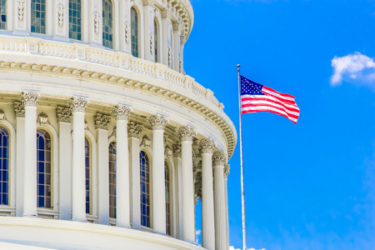
This week, President Obama fulfilled a promise to homosexual advocacy groups by signing an executive order that religious leaders warn will lead to the exclusion of some faith-based organizations from federal contracts because of their religious beliefs about marriage, sex, and gender. The executive order signed by the President on July 21 creates a heightened level of protection for employees of government contractors and the federal government who identify with or engage in homosexuality, bisexuality, transgenderism or any other “sexual orientation” or “gender identity.” Despite requests from religious leaders to exempt faith-based groups that contract with the federal government, the executive order does not include a religious exemption. During the signing ceremony at the White House, President Obama told a gathering of lesbian, gay, bisexual, and transgender (LGBT) workers and advocacy groups that they “are on the right side of history.”
The Human Rights Campaign (HRC) heralded the executive order as a “keystone act of a concerted, six-year effort by the White House to dramatically advance the cause of LGBT equality.” With his signature, the President has bypassed Congress to partially implement a long-standing goal of the homosexual agenda to get “sexual orientation” and “gender identity” added to federal Civil Rights laws, including employment laws, which essentially put sexual behavior on par with immutable characteristics, such as race and sex. The major vehicle that has been pursued in this effort is the Employment Non-Discrimination Act (ENDA), which would prohibit any business with 15 or more employees from discriminating on the basis of “sexual orientation” and “gender identity” in their hiring, firing, or employee status decisions. After ENDA passed the U.S. Senate earlier this year but stalled in the U.S. House over debate about the inclusion of a religious exemption, the President announced that he would take executive action.
The ENDA executive order signed by President Obama:
Regarding the notable absence of a religious exemption, a White House fact sheet explains that the order “does not allow for any exemption beyond the one added by Executive Order 13279, issued by President George W. Bush, which permits religiously affiliated contractors to favor individuals of a particular religion when making employment decisions.” That means that while a faith-based federal contractor can legally give hiring preference to employees of the same faith, they cannot refuse to hire a cross-dressing male applicant, for example.
By not including a religious exemption, the White House disregarded concerns raised by faith-based leaders, who warned that the order would result in discrimination against religious organizations that contract with the government. In June, nearly 160 faith leaders signed a letter to President Obama, requesting that the “executive order be written in a way that protects the religious freedom of faith-based service providers,” including many that “maintain employee moral conduct standards along with their requirement that staff members agree with the organizations’ religious commitments.” The letter noted that faith-based federal contractors provide “vital services,” including “overseas relief and development services in partnership with USAID,” and “services on contract with the Bureau of Prisons,” as well as “research, technical assistance, and other services via contracts and subcontracts with other federal departments and agencies.”
In a statement issued July 21, the U.S. Conference of Catholic Bishops said the ENDA executive order “will exclude federal contractors precisely on the basis of their religious beliefs.” Similarly, the National Association of Evangelicals (NAE) described the executive order as polarizing, warning, “Our entire society suffers when our government discriminates against religious groups and loses access to their services.”
While alarming, the lack of a religious exemption in the ENDA executive order is not surprising under an administration that has made the homosexual agenda a key part of its policy goals. Gaining special employment protections for LGBT individuals is a major stepping-stone toward normalizing LGBT behavior throughout society. The Church’s teachings on marriage, sexuality, and gender represent the number one barrier to that agenda, which is why LGBT groups view a religious exemption as unacceptable. Nowhere is this more apparent than in the recent decision by several LGBT groups and the American Civil Liberties Union (ACLU) to pull their support for the current version of ENDA legislation—simply because it includes a religious exemption. In a joint announcement issued July 8, the ACLU and four LGBT organizations warned that “until the [religious] exemption is removed so that anti-LGBT discrimination is treated the same as race, sex, national origin, age, disability, or genetic information under federal workplace laws, we think ENDA should not move forward in Congress.”
Through the ENDA executive order, the White House is echoing the sentiments of LGBT advocacy groups that sexual behavior and gender confusion are the same as being born African American or biologically female. Moreover, it is saying something far more dangerous – that one individual’s sexual choices are more important and more worthy of protection than the fundamental, constitutionally protected religious liberties of another.